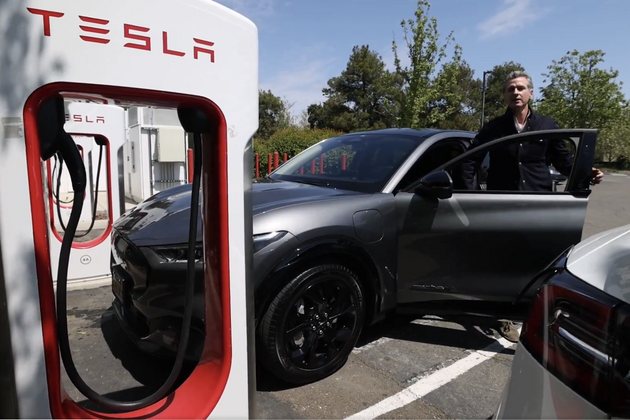EV Mandate Opposition: Car Dealers Double Down On Concerns

Table of Contents
Challenges in EV Infrastructure and Consumer Readiness
The transition to electric vehicles hinges on more than just producing the cars themselves. A robust and accessible infrastructure is crucial for widespread adoption, yet this is precisely where many of the concerns surrounding EV mandate opposition stem from.
Insufficient Charging Infrastructure
The lack of widespread, reliable charging stations, particularly in rural areas, remains a major obstacle. Range anxiety—the fear of running out of battery power before reaching a charging station—is a significant deterrent for potential EV buyers.
- Lack of fast-charging options: Many existing charging stations offer slow charging speeds, making long journeys impractical.
- Uneven distribution of charging networks: Charging stations are heavily concentrated in urban areas, leaving rural drivers stranded.
- Range anxiety concerns among consumers: The limited range of many EVs and the unpredictable availability of charging points contribute to consumer hesitancy.
For example, a recent study showed that in many sparsely populated states, the distance between charging stations can exceed 100 miles, making long-distance travel in an EV a significant challenge. This infrastructure gap directly impacts consumer confidence and fuels the opposition to EV mandates.
High Cost of EVs and Limited Affordability
The price difference between EVs and gasoline-powered vehicles presents another significant hurdle. The higher upfront cost of EVs makes them inaccessible to many consumers, particularly those with lower incomes.
- Higher upfront costs: EVs often command a significantly higher price tag than comparable gasoline-powered vehicles.
- Limited government incentives in some regions: While some governments offer incentives like tax credits, these are often insufficient to bridge the price gap.
- Impact on lower-income consumers: The high cost of EVs effectively excludes a large segment of the population from participating in the transition.
For instance, comparing a base model Tesla Model 3 to a comparable gasoline sedan reveals a price difference of several thousand dollars, a substantial barrier for many potential buyers. This affordability issue contributes significantly to the growing EV mandate opposition.
Dealer Training and Workforce Adaptation
The shift to EVs requires a significant investment in training and workforce adaptation for car dealerships. This represents a substantial challenge and a major driver of EV mandate opposition.
Need for Specialized EV Mechanic Training
Maintaining and repairing EVs requires specialized skills and knowledge different from those needed for gasoline-powered vehicles. Dealerships must invest heavily in retraining their existing mechanics and recruiting new EV-specialized technicians.
- Investment in new tools and equipment: Servicing EVs requires specialized tools and diagnostic equipment, representing a considerable financial burden.
- Retraining existing staff: Mechanics need extensive training to understand EV technology and repair techniques.
- Recruitment of EV-specialized technicians: The demand for EV mechanics far exceeds the current supply, creating a talent shortage.
The cost of this comprehensive retraining program, coupled with the investment in new equipment, is a major source of concern for dealerships and fuels their opposition to EV mandates.
Sales Staff Adaptation to EV Sales Strategies
Selling EVs requires a different approach than selling traditional vehicles. Sales staff must adapt their sales techniques to effectively communicate the benefits of EVs and address common consumer misconceptions.
- New sales strategies: Dealerships need to develop strategies that address consumer concerns about range, charging time, and upfront cost.
- Customer education initiatives: Educating customers about the advantages of EVs, such as lower running costs and reduced environmental impact, is critical.
- Addressing customer misconceptions about EVs: Many consumers harbor misconceptions about EVs, which sales staff must proactively address.
Sales training programs must adapt to these new realities, and the investment required adds to the pressures contributing to EV mandate opposition.
Government Regulations and Mandate Implementation
The way governments are implementing EV mandates is also a significant contributor to the opposition.
Concerns about Unrealistic Mandates
Dealerships express concerns about the speed and stringency of the EV mandates, fearing the inability to meet sales quotas and potential penalties for non-compliance.
- Concerns about meeting sales quotas: The aggressive timelines set by some mandates make it difficult for dealerships to meet sales targets.
- Potential penalties for non-compliance: The threat of substantial fines for not meeting the mandated sales quotas adds pressure.
- Lack of flexibility in implementation timelines: The rigid nature of some mandates leaves little room for adjustment based on real-world challenges.
The perceived lack of flexibility and the threat of penalties create significant anxiety and bolster the opposition to EV mandates.
Lack of Clarity and Support from the Government
Dealerships often report a lack of clear communication and sufficient support from government agencies regarding the implementation of EV mandates.
- Conflicting regulations: Inconsistent regulations across different jurisdictions create confusion and challenges for dealerships.
- Insufficient funding for infrastructure development: The lack of adequate funding for the expansion of charging infrastructure further exacerbates the issue.
- Inadequate support for dealer training programs: Limited government support for dealer training initiatives adds to the financial burden on dealerships.
The absence of clear guidance and adequate support from government agencies adds to the frustration and strengthens the EV mandate opposition.
Conclusion: Addressing the Growing EV Mandate Opposition
The challenges faced by car dealers in adapting to EV mandates are multifaceted: infrastructure gaps, high costs, training needs, and regulatory hurdles all contribute to the growing opposition. Addressing these concerns is crucial for a smooth transition to a more sustainable automotive industry. Understanding and addressing the concerns surrounding EV mandate opposition is crucial for a successful transition to electric vehicles. Let’s work together to find solutions that balance environmental goals with the needs of car dealers and consumers. Open dialogue, realistic timelines, and substantial government support are essential to overcome the obstacles and foster widespread EV adoption. Ignoring the valid concerns expressed in this EV mandate opposition risks hindering the very progress the mandates aim to achieve.

Featured Posts
-
 Major Fire Damages Dauphin County Apartment Complex
May 22, 2025
Major Fire Damages Dauphin County Apartment Complex
May 22, 2025 -
 Blake Lively And The Recent Allegations A Timeline
May 22, 2025
Blake Lively And The Recent Allegations A Timeline
May 22, 2025 -
 Lazio Earns Hard Fought Draw Against 10 Man Juventus
May 22, 2025
Lazio Earns Hard Fought Draw Against 10 Man Juventus
May 22, 2025 -
 Halvering Voedselexport Vs Analyse Van Abn Amro
May 22, 2025
Halvering Voedselexport Vs Analyse Van Abn Amro
May 22, 2025 -
 Abn Amro Kwartaalcijfers Impact Op De Aex Index
May 22, 2025
Abn Amro Kwartaalcijfers Impact Op De Aex Index
May 22, 2025
Latest Posts
-
 Concacaf Nations League Recopilacion De Memes Canada Vs Mexico
May 22, 2025
Concacaf Nations League Recopilacion De Memes Canada Vs Mexico
May 22, 2025 -
 Los Memes Mas Chistosos Del Canada Vs Mexico En La Liga De Naciones Concacaf
May 22, 2025
Los Memes Mas Chistosos Del Canada Vs Mexico En La Liga De Naciones Concacaf
May 22, 2025 -
 Liga De Naciones Concacaf Diversion Garantizada Con Los Memes De Canada Vs Mexico
May 22, 2025
Liga De Naciones Concacaf Diversion Garantizada Con Los Memes De Canada Vs Mexico
May 22, 2025 -
 Canada Vs Mexico Los Memes Mas Epicos De La Liga De Naciones Concacaf
May 22, 2025
Canada Vs Mexico Los Memes Mas Epicos De La Liga De Naciones Concacaf
May 22, 2025 -
 Memes Canada Vs Mexico Liga De Naciones Concacaf Los Mas Graciosos
May 22, 2025
Memes Canada Vs Mexico Liga De Naciones Concacaf Los Mas Graciosos
May 22, 2025
